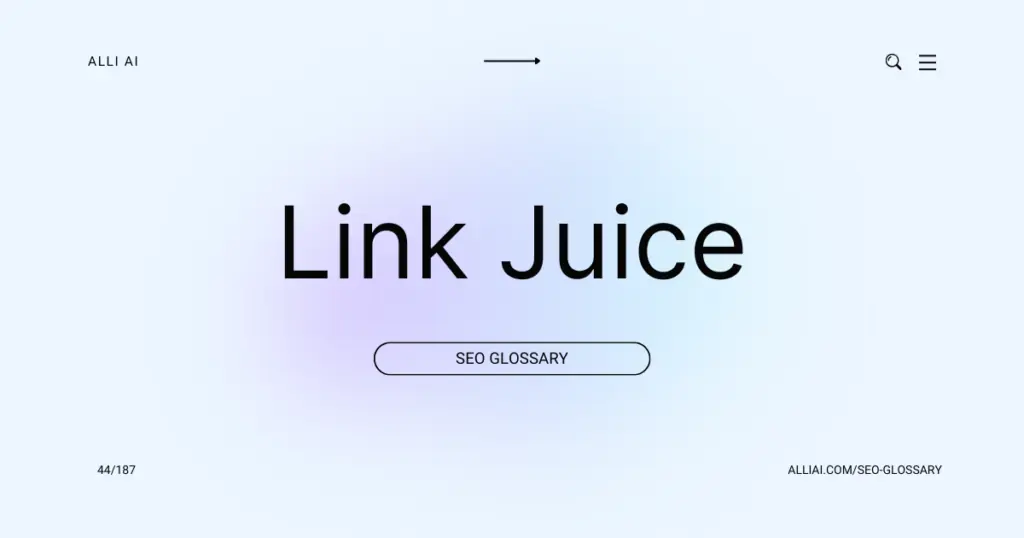What Does Link Juice Mean?
Link Juice refers to the SEO value or strength passed from one page or site to another through hyperlinks. When a webpage links to any other page, it shares some of its authority or ranking power with that page, helping to boost its position in search engine results. This concept is key in understanding how pages interconnect to enhance visibility and authority in search engine rankings.
Where Does Link Juice Fit Into The Broader SEO Landscape?
Link Juice, a term in SEO, refers to the value or authority that one page or site passes to another through a hyperlink. Search engines like Google use this as a signal for ranking purposes, assessing how links contribute to a page’s authority and its potential to rank well for relevant searches. The more high-quality links a page accumulates, the higher the Link Juice it receives, which can improve its visibility in search engine results pages (SERPs).
Link Juice can come from both internal links (links from the same website) and external links (links from other websites). The amount of Link Juice passed depends on several factors including the linking page’s authority, relevance to the target page, the placement of the link on the page, the anchor text used, and the number of other links sharing the Link Juice on the source page.
Managing and optimizing the flow of Link Juice involves strategies like using nofollow tags to prevent passing link equity to untrusted sites, improving the link structure within a site to ensure important pages receive more power, and acquiring backlinks from authoritative and contextually relevant external sites. This helps to boost the overall SEO performance of a website by not only enhancing its authority but also its relevance for specific search queries.
Real Life Analogies or Metaphors to Explain Link Juice
Link Juice is like electricity flowing through a series of connected wires. When a power source (a reputable website) sends current (links) to another appliance (your website), it powers it up, making it more functional and visible, similar to boosting your website’s ranking power in the eyes of search engines.
Another way to see Link Juice is as water flowing through a garden irrigation system. Each hose (link) channels water (authority and trust) from a main reservoir (high-authority website) to the plants (web pages). The more hoses channeling water to a specific plant, the healthier and more robust it grows, akin to web pages thriving in search engine results.
How the Link Juice Functions or is Implemented?
1. Creation of Backlinks: Link juice begins with a webpage linking to another site. The more authoritative and relevant the linking site, the more valuable the link juice.
2. Relevance: The relevance of both the linking page and the linked content affects the quality of link juice. Relevant links in a similar niche or domain are more effective.
3. Link Attributes: Attributes like “dofollow” and “nofollow” determine if link juice is passed. “Dofollow” links pass link juice, while “nofollow” links do not.
4. Authority of Linking Page: The PageRank or domain authority of the linking page influences the quantity and quality of link juice transmitted.
5. Number of Links on the Page: Link juice is divided among all outbound links on a page. More outbound links mean each link passes less juice.
6. Trustworthiness and Security: Secure sites (HTTPS) and those without spammy content or practices provide stronger link juice.
7. User Engagement: Links from pages with high user engagement (low bounce rates, high time on site) potentially contribute more positively.
8. Anchor Text: Anchor text can inform search engines about the topic of the link, hence affecting the value of link juice if it accurately reflects the content.
9. Link Placement: Links placed higher in the main content of a webpage, and in contextually relevant material, typically pass more link juice than footer or sidebar links.
10. Direct vs. Redirected Links: Direct links pass more link juice compared to links that go through redirects. Multiple redirects may dilute it further.
Impact Link Juice has on SEO
Link Juice, a term synonymous with “link equity,” refers to the value and authority that one webpage passes to another through hyperlinks. This SEO mechanism significantly affects a website’s SEO performance and rankings, as search engines like Google use it as a key ranking signal. When a highly authoritative site links to another website, it effectively “passes” some of this authority. The higher the quality and authority of the linking page, the more positive the impact on SEO performance.
This transfer of value can help increase the domain authority of the receiving site, signaling to search engines that the content is valuable, credible, and useful, thereby improving its rankings. Moreover, effective use of Link Juice can lead to higher visibility and organic traffic, as search engine algorithms often reward well-linked content with better positions in search results.
User experience can also be subtly influenced by how Link Juice optimizes a site’s architecture. Strategic internal linking ensures users find more relevant content easily, potentially increasing on-site engagement, lowering bounce rates, and encouraging longer visit durations. This improved user interaction signals to search engines the utility and quality of the website, further enhancing SEO success.
SEO Best Practices For Link Juice
1. Create High-Quality Content: Make sure your content is informative, engaging, and provides value to readers. High-quality content is more likely to be linked by other websites.
2. Use Strategic Anchor Text: Employ relevant, concise, and keyword-rich anchor text for internal links and when obtaining external links.
3. Implement a Solid Internal Linking Structure: Link related pages within your site to pass authority and guide users to more relevant content, enhancing user experience and SEO.
4. Gain Backlinks from High Authority Sites: Focus on acquiring links from reputable and authoritative websites. These links pass more valuable link juice.
5. Make Use of Dofollow Links: When applicable, ensure that external links to your site are dofollow links, as these pass on link approval and boost your site’s ranking.
6. Fix Broken Links: Regularly check for and repair any broken links within your site. Broken links can hinder the flow of link juice.
7. Optimize Your Site Structure: Ensure that your website has a logical hierarchy and simple navigation to help distribute link equity throughout your site effectively.
8. Utilize a 301 Redirect for Discontinued Pages: If you remove a page that has backlinks, use a 301 redirect to transfer the accumulated link juice to a relevant existing page.
9. Regularly Conduct Link Audits: Regularly review your inbound links and evaluate their quality and relevance. Disavow any spammy or harmful links.
10. Engage in Guest Blogging: Write articles for other relevant blogs in your industry to earn backlinks and thus ink juice, ensuring that the links are natural and relevant.
11. Monitor Competitors’ Backlinks: Analyze where competitors are obtaining their backlinks and explore opportunities for your site to acquire similar or better links.
12. Leverage Social Media Sharing: While social media links are typically nofollow, social shares can lead to increased visibility and more organic backlinking opportunities.
13. Be Active in Relevant Online Communities: Participate in forums, blogs, or other relevant online communities to create relationships that can lead to natural backlink opportunities.
Common Mistakes To Avoid
1. Acquiring low-quality links: Opt for links from reputable, high-authority sites rather than quantifying links from poorly rated, irrelevant, or spammy websites, which can harm your site’s credibility and SEO ranking.
2. Ignoring internal linking: Develop a strategic internal linking structure that distributes link juice to important pages, enhances user navigation, and increases the SEO performance of various pages in your domain.
3. Excessive use of nofollow links: Overusing rel=”nofollow” attributes stops the flow of link juice to other pages, which could have boosted your site’s SEO performance. Use nofollow judiciously.
4. Linking to penalized sites: Ensure that the sites you link to are not penalized by Google, as linking to them could negatively impact your own SEO efforts and decrease your site’s trustworthiness.
5. Neglecting anchor text relevance: Use relevant and concise anchor texts that provide clear indication of the linked page’s content; generic or misleading anchor texts can dilute link juice value and confuse users.
6. Unbalanced link distribution: Distribute links evenly across your pages instead of concentrating them on a few. Overloading a single page with excessive inbound links can appear manipulative to search engines and may trigger penalties.
7. Failing to update or remove broken links: Regularly audit your website to update or remove dead links that waste link juice and harm user experience and site reputation.
Each of these missteps can be mitigated by adopting a thoughtful approach to link building and internal link structuring, always focusing on the quality and relevance of links over sheer quantity.






